Disabilities
Therapists at Schreiber Went Above and Beyond to Help My Son Thrive: A Personal Testimonial
February 27, 2024Written by: Schreiber Client Brayden’s Mom, Alicia Earnesty
Brayden has been attending therapy at Schreiber Center for Pediatric Development for over 5 years now. As a medically complex child, Brayden has many diagnosis and challenges including intractable epilepsy(LGS) and cortical visual impairment. He first began receiving PT, OT, Speech, Feeding and Aqua therapy as we desperately searched for ways to help. He was unable to hold his head up, bare weight, sit up, functional use his hands or share any form of communication.

The amazing therapist at Schreiber immediately began to create a plan. His team has went above and beyond to research, learn other strategies and implement accommodations to help him thrive. The begin years were a true struggle to make progress in the midst of survival mode between hospitalizations and seizures. Covid hit which forced us to pivot to virtual therapy for 2 years working remotely from our basement therapy room. The amazing therapist never gave up and little by little we celebrated Brayden’s inch stones. We celebrated sitting on his own, sit to stand, learning to crawl, standing with support, utilizing both hands, grabbing/holding objects, pointing, saying his first words, making choices and using a communication device. Brayden underwent several brain surgeries over the years and the therapist never skipped a beat to help him rehab, bounce back and make leaps of progress.
Looking back upon all the years of intensive therapy, it brings joyful tears to our eyes as to how far Brayden has come. Today, Brayden is a walking talking miracle and true representation to never give up hope. Brayden can voice, sign and use his adapted communication device to share what he is thinking, needing and even what he doesn’t want. Brayden can now eat foods by mouth and working so hard on independent fine motor skills. Brayden can now independently walk, go up/down stairs, squat to pick up items, and even run!
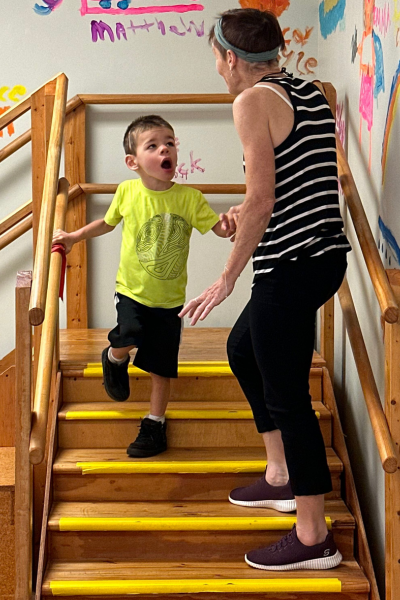
Brayden waves and squeals with excitement on therapy days. We love calling “the duck duck place” (as Brayden calls it) home as Schreiber has become family and we are forever grateful for the staff and therapists. Thank you to Lisa, Maddy, Rebecca, Libby, Deanna, Meghan, Sarah, Christen, Adrian and so many more for your impact on his journey. To other families looking for the supports your child needs, Schreiber is the BEST in the area hands down. Partnering with them and continuing to implement at home, the sky is the limit!
Help Schreiber Clients like Brayden receive the care they need, consider donating in support of our Kids’ Care Fund, a long and short term savings account used to cover the costs of uncompensated care.
As a nationally recognized pediatric facility, the Schreiber Center for Pediatric Development provides family-centered education and therapy programs for infants, children and adolescents with disabilities, developmental delays, and acquired injuries. Our goal-oriented approach maximizes each child’s ability to function independently within the community.
General Monthly eNewsletter Sign Up
Sign up to receive monthly newsletters to your email box to learn more about what is going on at the Schreiber Center, and how you can help support our mission to help every child in need reach their fullest potential.
How Schreiber Transformed Our Son’s Feeding Challenges: A Personal Testimonial
January 30, 2024Written by: Schreiber Client Finn’s Mom, Danielle Gwilt
Our son Finn was diagnosed with food allergies shortly after his first birthday, and a chronic digestive condition called Eosinophilic Esophagitis (EoE) about a year after that. Due to allergies and discomfort due to EoE, feeding Finn was a challenge pretty quickly after he began solid foods. He was incredibly reluctant to try or even touch new foods or drinks. Finn started occupational therapy, prior to coming to Schreiber, at 18 months for these feeding aversions and sensory issues. While this initial round of OT helped us to learn about Finn’s sensory needs, we made no progress at all with his eating and decided to stop the therapy. We were then referred to a speech therapist outside of the Schreiber Center to see if they could help. After about a year of visits with them, while Finn had made minor progress, they felt we didn’t have anything new to try and we were discharged from their care.
During a visit with his nutritionist around Finn’s third birthday we were discussing his ongoing feeding issues and she recommended that we reach out to the Schreiber Center for Pediatric Development. She recommended we try to see Sarah Terry specifically if she was available, as she had heard Sarah was especially good with strong-willed, picky eaters. We quickly realized how right she was! A few months after Finn turned 3 we had our evaluation and acceptance into Schreiber’s OT program, and were lucky enough to get a slot in Sarah’s schedule.
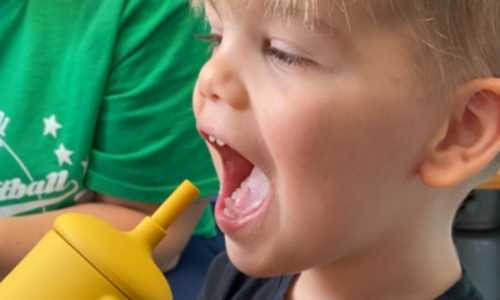
At the time of our admission, Finn (3 years old) was drinking from a bottle only, would only drink oat milk, and refused every type of cup offered. He was only eating 8-10 foods with regularity. He was also still eating baby food purees every day as one of his main foods. Our initial goals with Schreiber were to get Finn to try new foods, add new foods into his diet as regularly accepted foods, and to drink out of anything other than a bottle.
Initially, Finn was very reluctant to attending therapy, likely because he had been through other programs. What Schreiber offers is so different from anywhere else we had been. Schreiber allows for kids to make their own choices (toys they want to play with, a certain apparatus they may want to try, etc.) while still working toward the child’s goals and setting clear boundaries. Finn quickly warmed up to Schreiber and to Sarah due to the fun atmosphere and the incredible patience and understanding she showed while working with us. Sarah employed a wide array of play-based OT to entice Finn to try new foods. He was able to get the needed sensory input to his body by jumping and climbing in the large OT room before moving to a smaller room for therapy. Sarah would spend time playing with toys, games, painting, etc. in exchange for Finn touching, playing with, and eventually tasting the new foods.

Sarah took the time to get to know Finn and his interests and form a true relationship with him. She made his appointments fun and silly, all while working towards his goals. She was never visibly frustrated with him, even through some incredibly frustrating visits where he would flat-out refuse to cooperate. And she celebrated each win with us – no matter how small. Her positive and good-natured attitude made returning each week a pleasure, rather than the chore that therapy can often feel like. Sarah gave us suggestions on foods to try, ways to make slight alterations to foods to get him to accept new things, and a ton of tools to use at home as well.
We’d be remiss if we didn’t also mention Lisa at the front desk! She always welcomed our family with a smile and would greet Finn by name within just a few short weeks of his attending Schreiber. She truly assists in making Schreiber feel welcoming from the time you walk in the front door.
The progress Finn made through our time at Schreiber is truly remarkable. His willingness to try new foods, and to try foods more than once, has grown exponentially. He has a much larger catalog of widely accepted foods he’ll eat on a routine basis. He no longer drinks out of a bottle and will drink more than just one type of drink.

There are no words to express how much Schreiber positively impacted our lives. We are forever grateful to Sarah and the team at Schreiber for all they did for us and would highly recommend them to anyone whose child needs assistance!
Help Schreiber Clients like Finn receive the care they need, consider donating in support of our Kids’ Care Fund, a long and short term savings account used to cover the costs of uncompensated care.
As a nationally recognized pediatric facility, the Schreiber Center for Pediatric Development provides family-centered education and therapy programs for infants, children and adolescents with disabilities, developmental delays, and acquired injuries. Our goal-oriented approach maximizes each child’s ability to function independently within the community.
OASUS Harness System Takes Pediatric Physical Therapy to New Heights at Schreiber Center
January 18, 2024The new physical therapy gym at the Schreiber Center for Pediatric Development is now open! This state-of-the-art facility is equipped with a range of innovative equipment and open spaces, all meticulously designed to enhance therapy sessions for all our PT patients. This environment allows for more personalized therapy in a warm and inviting atmosphere, filled with natural light, vibrant colors, and a sense of fun. It is particularly welcoming to our young patients, putting them at ease, making them more receptive to therapy, and eager to engage in their rehabilitation.
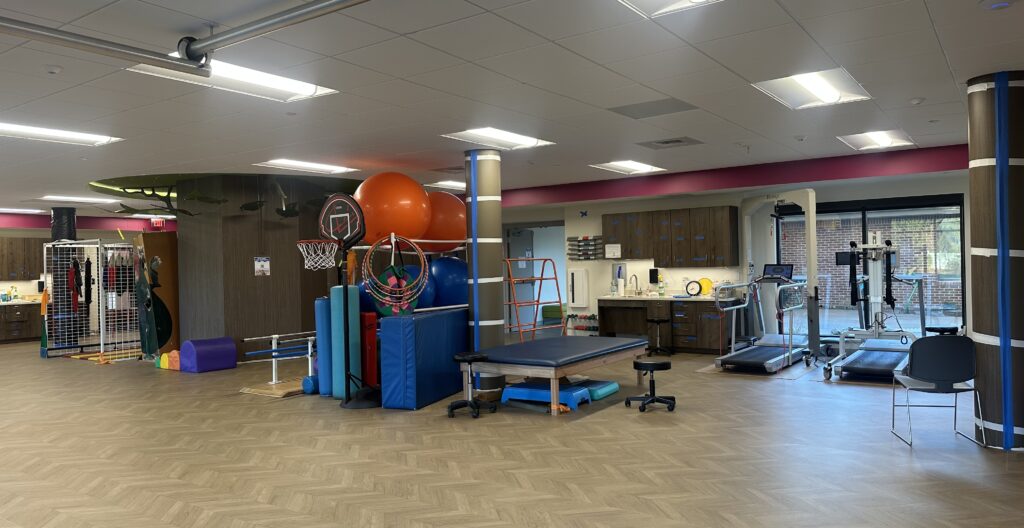
One of the most exciting features of our new gym is the introduction of the OASUS Harness System, a cutting-edge bodyweight support system that takes pediatric physical therapy to the next level. Provided by Enliten LLC, this system offers a flexible and dynamic approach to gait training, enabling our young patients to experience a greater range of motion, including rotational and frontal plane movement. This added versatility is crucial in helping our children develop their motor skills, balance, and coordination. The OASUS system also incorporates bungee cords, encouraging active engagement and fostering independence, thus strengthening their muscles and overall physical development. Furthermore, it simplifies therapists’ work on important milestones like stair climbing.

Our new rock wall adds a fun and challenging element to physical therapy sessions for many of our clients. Climbing the rock wall helps children build strength, coordination, and self-confidence while enjoying the process. Combining engaging activities with therapeutic methods is just one way our physical therapists help children reach goals others didn’t believe possible. We’ve expanded our gym to include new exercise equipment, including stationary bikes, to further this goal.
Safety is a top priority at Schreiber, and we’ve updated our mat tables to provide a comfortable and safe surface for various therapeutic exercises and activities in the new gym. These tables offer enhanced support for our children during stretching and strengthening routines, creating a more conducive environment for their rehabilitation.
“The new gym has provided us with more space and flexibility for personalized therapy. It is very inviting and bright and fun. The several new additions including the OASUS, rock wall, and new mat tables allow us to have even more treatment options to provide the best therapy to the kids that we serve.”
– Laurie Panther, Physical Therapist at the Schreiber Center.
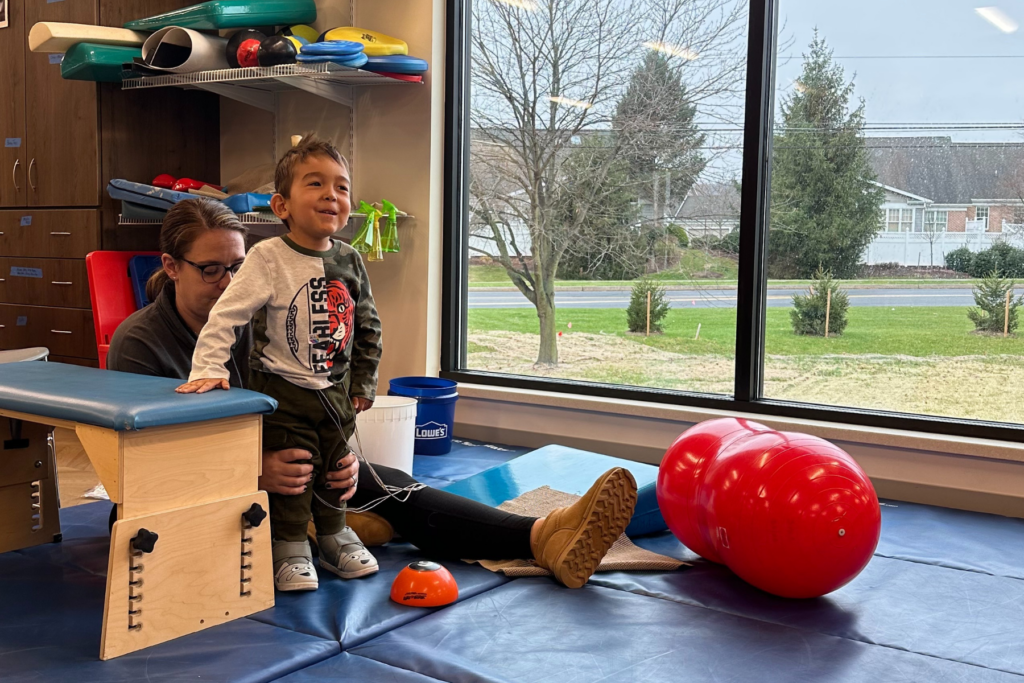
Have you ever seen a tree in the middle of a PT gym? If you’ve had sessions in ours, you have. And soon, we’ll be introducing sensory boards and other vertical play areas to enhance our therapy sessions even further on this tree. These additions will provide opportunities for sensory integration and cognitive development. Just another example of how we’re making therapy not only effective but also enjoyable for our young patients.
While the main gym is complete and open to clients, we are still working on completing extra treatment rooms dedicated to casting and pelvic floor treatments, greatly enhancing the level of care we can offer. These specialized rooms will ensure that our children receive the individualized attention they deserve, with access to the specific therapies they require.
The new physical therapy gym at the Schreiber Center stands as a testament to our commitment to the children and families we serve. We are deeply grateful to our supporters, donors, and partners who have made this space possible. Stay tuned for updates as we continue our renovations throughout the center to bring our clients the most innovative and up-to-date technology and services available. The future is bright at the Schreiber Center, and we can’t wait to share it with you!
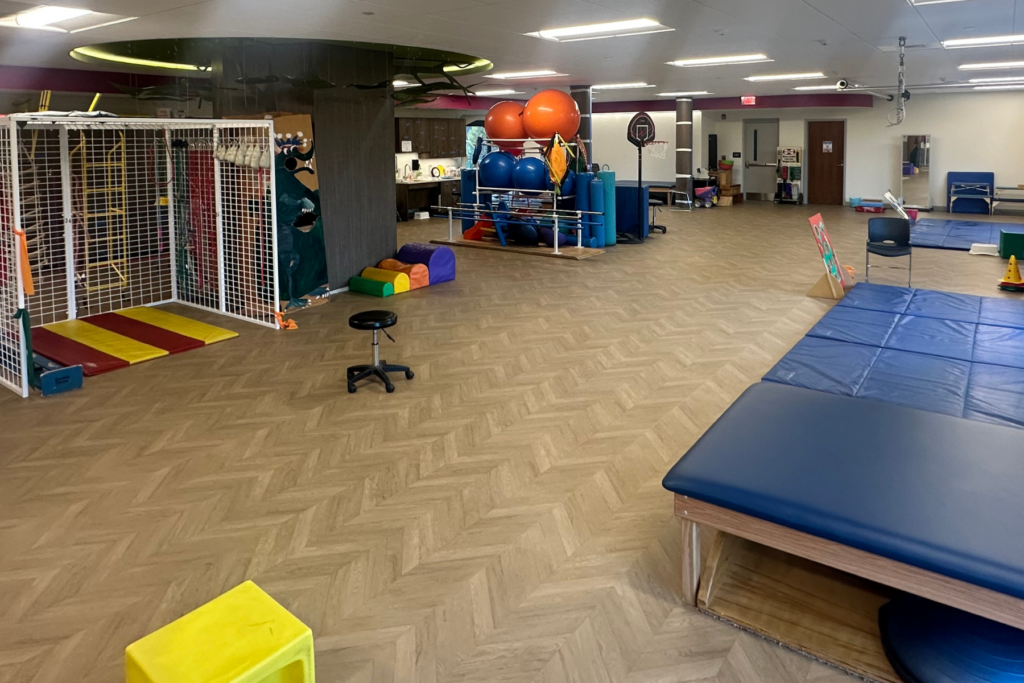
Donate today to help us continue to update and improve our spaces so that we can provide quality care to more children in need.
As a nationally recognized pediatric facility, the Schreiber Center for Pediatric Development provides family-centered education and therapy programs for infants, children and adolescents with disabilities, developmental delays, and acquired injuries. Our goal-oriented approach maximizes each child’s ability to function independently within the community.
Thank You to our 2023 Ambassadors!
December 31, 2023As we reflect on 2023, we are filled with gratitude for the amazing kids and families who have allowed us to spotlight their journeys through our therapy services, the true champions of our mission – our 2023 Schreiber Ambassadors!

It is through your tireless efforts that you’ve helped spread awareness about the vital work we do at Schreiber. Your advocacy has not only shone a spotlight on the challenges faced by those we serve but has also illuminated the pathways to hope and healing that our organization provides.
Your participation in our fundraising initiatives has been nothing short of extraordinary. By leveraging your networks and utilizing your influential voices, you’ve helped reach and exceed our goals all year so that we can continue making a meaningful difference in the lives of all #SchreiberKids. Your commitment to the betterment of our community is not only commendable, but also deeply appreciated.
As we express our gratitude, we also want to acknowledge the impact you’ve had on fostering a sense of community and belonging within the Schreiber family. Your enthusiasm has resonated with others, creating a ripple effect that strengthens the bonds of support and solidarity among those who share a connection to our organization.
In recognition of your exceptional contributions, we want to express our deepest appreciation. Your willingness to be ambassadors for Schreiber has not only elevated our mission but has also touched the hearts of those who have had the privilege of hearing your stories.
Thank you, 2023 Schreiber Ambassadors, for everything you’ve done to support our mission this year!
Support the therapy and education of our current and future Schreiber kids by donating to our Kids’ Care Fund today!
As a nationally recognized pediatric facility, the Schreiber Center for Pediatric Development provides family-centered education and therapy programs for infants, children and adolescents with disabilities, developmental delays, and acquired injuries. Our goal-oriented approach maximizes each child’s ability to function independently within the community.
Schreiber’s Commitment to Children’s Healthcare
November 20, 2023World Children’s Day is a time to reflect on the challenges that children face and to highlight the initiatives that are making a positive impact on their lives. This year, we’d like to draw your attention to the critical issues surrounding children’s healthcare and the efforts we’re making here at the Schreiber Center for Pediatric Development to address these challenges.
Access Disparities
One of the most pressing issues in children’s healthcare is the glaring disparities in access to medical services. Many children in underprivileged communities continue to lack proper healthcare due to financial, geographical, and cultural barriers. We recognize this inequality and have made great strides to help bridge this gap in central Pennsylvania.

We provide comprehensive pediatric care services and affordable healthcare options. As one of the only pediatric therapy centers in the area to accept Medicaid insurance as a payment option we service many children who otherwise would not receive the pediatric therapy services they need. Our ‘Kids’ Care Fund’ ensures that every child that comes to our center for therapy receives the care they need, regardless of their family’s financial situation.
Childhood Disabilities
Children with disabilities require specialized care and support to thrive and reach their full potential. One size does not fit all when it comes to healthcare for children. Which is why we offer a range of therapy services, including mental and behavioral health, physical, occupational, and speech therapy, each tailored to the unique needs of the individual child.
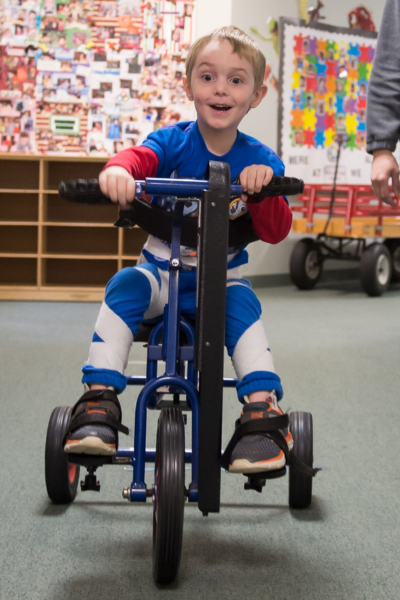
Through these programs, our Schreiber kids are provided with the tools they need to overcome the challenges they face, enabling them to flourish in their own way.
Pediatric Mental Health
The increasing mental health challenges in children are a mounting concern for parents, with far-reaching implications for the community. To help address this issue, we have integrated a new mental and behavioral health therapy department into our holistic approach to pediatric care that focuses on play-based and cognitive-behavioral therapies.
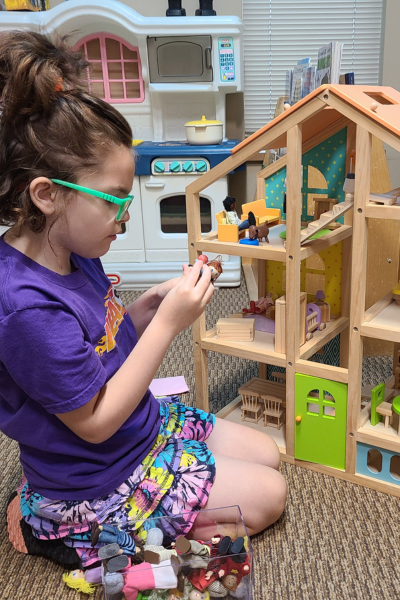
Our pediatric therapists specialize in diagnoses such as attention deficit hyperactivity disorder, autism spectrum disorders, depression, stress, anxiety, trauma related disorders, adoption, divorce, abuse, grief, and more. By providing counseling, emotional support, and resources, it is our goal to contribute to the emotional well-being of both children and their families and is an essential part of our commitment to the overall health and happiness of the children we serve.
Inclusive Education for Kids
The link between education and health is undeniable, yet many children face health issues that hinder their ability to access quality education, creating a cycle of disadvantage. Our S.T.A.R.S. Preschool is dedicated to reverse mainstreaming and has expanded our program that was once exclusively designed for children with special needs to include children of all abilities.
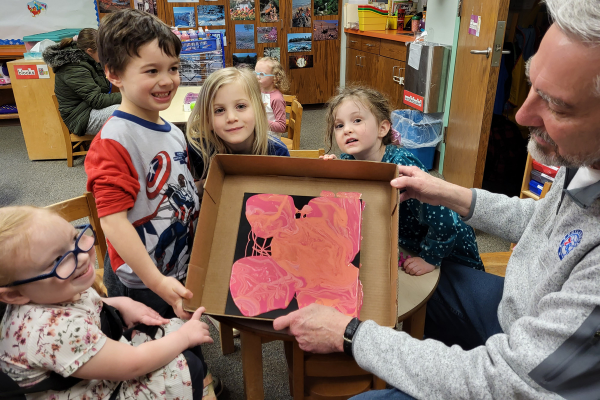
It is our hope that by playing together, our kiddos learn to not only understand and accept diversity, but to also value it. We also collaborate with the IU13 program to ensure that children with disabilities have equal access to quality education and are receiving any additional help they need. It is important to us that every child has the opportunity to learn and grow, regardless of their physical or mental challenges.
Support for Special Needs Children
We are proud to serve children with special needs and ensure that they receive the care and attention they require to thrive. We never hesitate to go the extra mile in providing resources and support for children with complex medical needs and chronic conditions. This includes assistance with obtaining medical equipment, specialized care, and respite services. We believe that by providing these services and support to our Schreiber families, children with special needs can lead fulfilling lives, and their families can find solace in knowing that their child’s unique requirements are met with compassion and expertise.
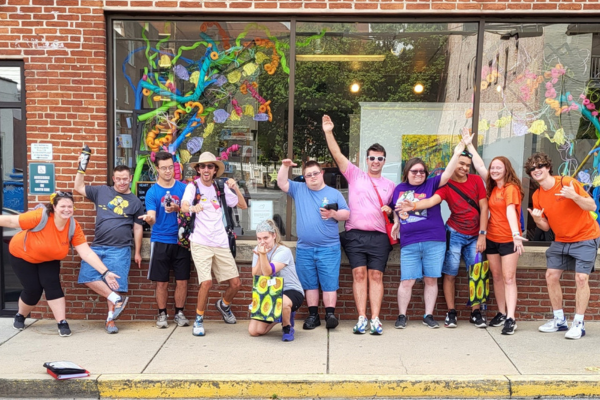
On World Children’s Day, we strive to be a beacon of hope and support, addressing the multifaceted challenges that children’s healthcare faces. Through our commitment to accessible, compassionate, and comprehensive care, we are working to improve the lives of children and their families, helping them overcome obstacles and reach their full potential. When every child receives the healthcare, support, and opportunities they deserve our purpose will be fulfilled.
To help us continue to provide necessary therapies to our Schreiber kids, consider donating to our Kids’ Care Fund to support our uncompensated care costs.
As a nationally recognized pediatric facility, the Schreiber Center for Pediatric Development provides family-centered education and therapy programs for infants, children and adolescents with disabilities, developmental delays, and acquired injuries. Our goal-oriented approach maximizes each child’s ability to function independently within the community.
ExtraGive Funds Pediatric Therapy at Schreiber
October 31, 2023Every child deserves the opportunity to lead a healthy and fulfilling life. At the Schreiber Center for Pediatric Development, we are committed to ensuring that every child, regardless of their abilities or financial circumstances, has access to the quality care they need.

The ExtraGive event (https://www.extragive.org/) is a remarkable opportunity for us to come together as a community and make a significant impact on the lives of children who rely on our pediatric therapy programs. Your generous donations during the ExtraGive event will directly benefit our occupational, physical, speech, and mental and behavioral health therapy programs, as well as our “Kids’ Care Fund” designed to cover uncompensated care expenses.
Pediatric Occupational Therapy: Feeding Program
Pediatric occupational therapy is a crucial component of the services we provide at Schreiber Center for Pediatric Development. Many children face challenges related to feeding and nutrition, and our goal is to support them in developing the necessary skills for a healthy diet. Your donations will help us establish a new feeding program that will provide personalized support to children with various feeding difficulties.
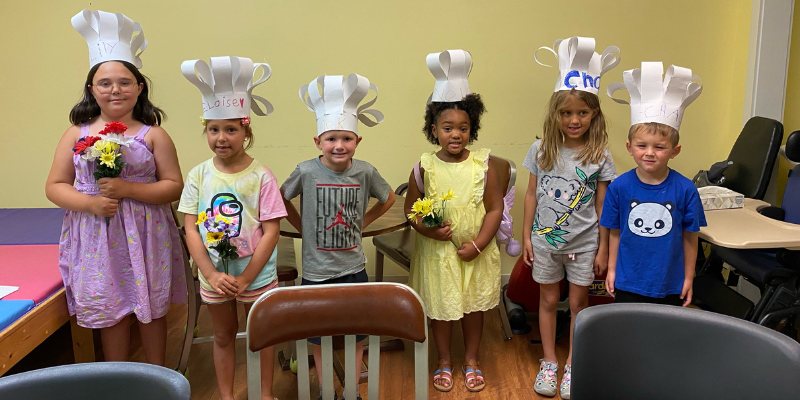
Feeding issues can be a source of tremendous stress for families, and your contributions will make it possible for us to offer specialized therapy, equipment, and resources to help these children develop the skills they need to thrive.
Pediatric Physical Therapy: Medical Mobility Equipment

Children with mobility impairments often require specialized equipment to enhance their mobility and independence. The funds donated during the ExtraGive event will be instrumental in acquiring essential medical mobility equipment for our pediatric physical therapy program.
These devices can be life-changing for children, enabling them to participate in everyday activities and improving their overall quality of life. Your support will help us ensure that no child in central PA is left without the necessary equipment to navigate the world around them.
Pediatric Speech Therapy: Communication Devices
Communication is a fundamental aspect of a child’s development, and for some children, it can be particularly challenging. Our pediatric speech therapy program is dedicated to helping children develop their communication skills, and your donations will play a pivotal role in achieving this goal.
We aim to provide augmentative and alternative communication (AAC) devices, speech-generating devices (SGDs), and other assistive communication tools to children who need them. These devices empower children to express themselves, connect with others, and engage with the world in meaningful ways.

Mental and Behavioral Health Therapy: After-School Social Programs
At Schreiber Center for Pediatric Development, we recognize the importance of mental and behavioral health in a child’s overall well-being. Your donations will support our after-school social programs, including the popular “After-School Lego Club,” designed specifically for children with autism.
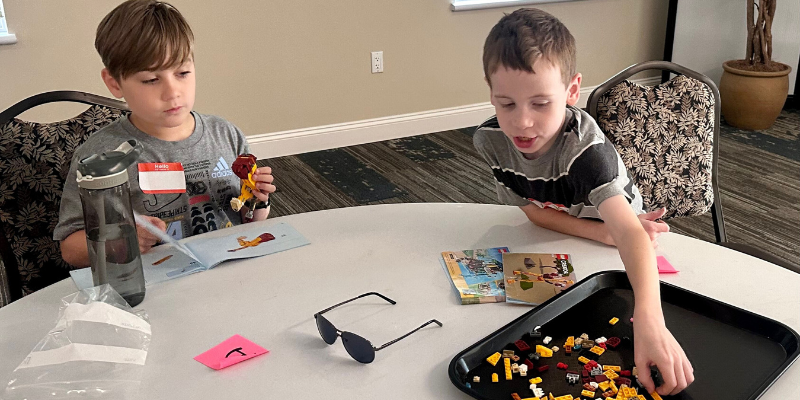
These programs offer a safe and supportive environment where children can develop social skills, build friendships, and gain confidence. Your contributions will enable us to expand these programs, reaching even more children who can benefit from them.
The “Kids’ Care Fund”: Ensuring Access to Care for All
In addition to directly supporting our therapy programs, your generous donations during the ExtraGive event will be added to our “Kids’ Care Fund.” This fund serves as a safety net, ensuring that all disabled children receive the care they need, regardless of their families’ financial circumstances.
The “Kids’ Care Fund” is a savings account that bridges the gap between what private insurance and Medicaid supplements cover and the actual cost of care. At Schreiber Pediatric, we have always made the promise that no child will be turned away, and your contributions help us fulfill this commitment.

Your support during the ExtraGive event will have a profound and lasting impact on the lives of the children we serve through our pediatric therapy programs at Schreiber Center for Pediatric Development. Whether it’s helping a child improve their feeding skills, providing essential mobility equipment, enabling communication, or fostering social connections, your generosity makes it all possible.
Furthermore, your donations will contribute to the “Kids’ Care Fund,” ensuring that no child is denied the care they deserve due to financial constraints. Together, we can make a difference in the lives of Schreiber kids and their families, offering hope, support, and a brighter future. Join us in transforming lives and creating a more inclusive and compassionate community for all children in central PA. Donate during the ExtraGive event and be a part of something truly extraordinary.
Go Big or Go Home: Javion Rodriguez
October 25, 2023“Go Big or Go Home” says Schreiber client, Javion Rodriguez, who went big this summer when he played in the Little League World Series Challenger Series. For 30 years this series for kids and teens with physical or mental disabilities has invited the best teams in the world to compete, and for the very first time a local team from Lancaster, PA received the invitation.

As one of the older members of the Lancaster PA team Javion says he feels like a role model and leader amongst the team and takes his position seriously. There is part of him that can’t wait to play in the senior league and really show the world what he’s capable of though. When asked what his favorite part of the game was, he had a difficult time choosing his time at shortstop or batting. He settled on the excitement of batting when he recalled his favorite part of the LLWS game was when he was walking to the plate for his at bat and received a standing ovation from the crowd.

In the off season, Javion works on his fielding skills and hitting off a T in his yard at home. During his physical therapy sessions here at Schreiber he prefers to work on specific exercises that will help strengthen the muscles needed to improve his game. Strengthening his core and improving his stance and swing are his personal physical therapy goals right now. Under instruction and supervision of his therapists here at Schreiber, Javion uses weights during rotation exercises designed to strengthen his obliques and performs a modified foam roller plank to strengthen his arms, legs, and core all while working on improving his coordination.

His passion for all things sports has helped him secure his current job as a sports analyst, interviewing and reporting on players, writing articles, and even doing a bit of marketing for a local ‘backyard’ baseball league. Currently a Freshman at McCaskey with straight A’s and an interest in math, Javion plans to graduate high school, go to college and play baseball in the Challenger League for as long as he remains a student. We have no doubt Javion Rodriguez will always “Go Big”!

To help Schreiber Clients like Javion continue to receive the care they need, consider donating in support of our uncompensated care fund.
As a nationally recognized pediatric facility, the Schreiber Center for Pediatric Development provides family-centered education and therapy programs for infants, children and adolescents with disabilities, developmental delays, and acquired injuries. Our goal-oriented approach maximizes each child’s ability to function independently within the community.
Down Syndrome Awareness Month
October 16, 2023This month we have the opportunity to raise public awareness about the condition Down Syndrome, as we advocate for the inclusion and acceptance of people with Down Syndrome. It is an unfortunate fact that people with Down Syndrome continue to face stereotypes and misconceptions about their abilities. We urge you to take this month to learn more about this condition and help us to spread the message of acceptance and respect for all people with Down Syndrome all year round.
What is Down Syndrome?
Down Syndrome is a genetic condition that occurs when a person is born with an extra chromosome. People are typically born with 46 chromosomes, but a person with Down Syndrome has an extra copy or part of an extra copy or chromosome 21.
There are three different types of Down Syndrome, and they are all dependent on how the extra chromosome 21 presents within the diagnosed person.
The most common type of Down Syndrome is called Trisomy 21, and about 95% of people who are diagnosed with Down Syndrome are diagnosed with this type. Trisomy 21 means that each cell within the body has three copies of chromosome 21 instead of the usual two copies.
The second most common type of Down Syndrome is called Translocation Down Syndrome and only about 3% of people diagnosed with Down Syndrome have this type. Translocation Down Syndrome occurs when an extra part or a whole extra chromosome 21 is present but attached ‘trans-located’ to a different chromosome, rather than being separate as is the case of Trisomy 21.
The least common type of Down Syndrome is called Mosaic Down Syndrome and only 2% of people who are diagnosed with Down Syndrome have this type. Mosaic Down Syndrome means that some of the cells in the body have three copies of chromosome 21, but other cells in the body still only have the typical two copies. Because only some of the cells in the body contain this additional chromosome this type of Down Syndrome presents less dominantly in physical features than the other two.
How do I know if my child has Down Syndrome?
About 6,000 babies are born with Down Syndrome in the US every year: that’s about 1 in every 700 babies. Down Syndrome can be detected in utero with screening tests and/or diagnostic tests. Screening tests can tell you if your pregnancy has a higher or lower chance of resulting in a baby with Down Syndrome, but they do not provide an absolute diagnosis. Diagnostic tests on the other hand, can typically detect whether a baby will have Down Syndrome. Diagnostic tests can be risky and are not generally performed until after a positive screening test. They include Chorionic villus sampling (CVS) which examines the material from the placenta, Amniocentesis which examines the amniotic fluid, and Percutaneous umbilical blood sampling (PUBS) which examines the blood from the umbilical cord. Each of these tests look for changes in the chromosomes that would indicate a Down Syndrome diagnosis.
What causes Down Syndrome?
Researchers know that Down Syndrome occurs when a person is born with an extra chromosome 21, but they are unsure how or why the extra chromosome forms. Many researchers believe that there are several different factors that play a role in whether the extra chromosome 21 will form in utero, but they are not entirely sure what those factors are. It is known that the likelihood of a baby being born with Down Syndrome increases with a mother’s age, but because more women give birth before they turn 35, more babies with Down Syndrome are born to women under 35 years of age. Nothing that a parent does during pregnancy is known to cause Down Syndrome.
What are the complications of Down Syndrome?
About half of people with Down Syndrome also have a congenital heart defect. They are also more prone to hearing loss, ear infections, obstructive sleep apnea, respiratory issues, eye diseases, poor eyesight, Alzhemer’s disease, leukemia, thyroid disorders and intestinal blockages at birth that require surgery.
In addition to the physical complications that can come along with Down Syndrome, it can also cause intellectual and developmental symptoms that can lead to cognitive impairment. Similar to the physical complications these symptoms can range from mild to moderate and include short attention span, poor judgement, impulsive behavior, slow learning, and delayed language and speech development.
What is the treatment for Down Syndrome?
Making sure that a child with Down Syndrome receives services early in life will help them to improve their physical and intellectual abilities and ensure that they reach their full potential into adulthood. Most of the services recommended for children with Down Syndrome focus specifically on helping them minimize the effects of any intellectual or developmental symptoms the condition is responsible for. Early intervention services include speech therapy, occupational therapy, and physical therapy.
These therapies can be beneficial to children with Down Syndrome past the years of early intervention as well. Each person with Down Syndrome has different talents, and they all have the ability to thrive. Down Syndrome is a lifelong condition and children with Down Syndrome may need extra help or attention in school, but with the proper treatment plan and early intervention many people with Down Syndrome are able to be mainstreamed and attend regular classes with their peers.
If you child has been diagnosed with Down Syndrome and you are interested in learning more about how Schreiber’s Pediatric Therapies can help your child visit: http://www.schreiberpediatric.org/therapy-services/
As a nationally recognized pediatric facility, the Schreiber Center for Pediatric Development provides family-centered education and therapy programs for infants, children and adolescents with disabilities, developmental delays, and acquired injuries. Our goal-oriented approach maximizes each child’s ability to function independently within the community.
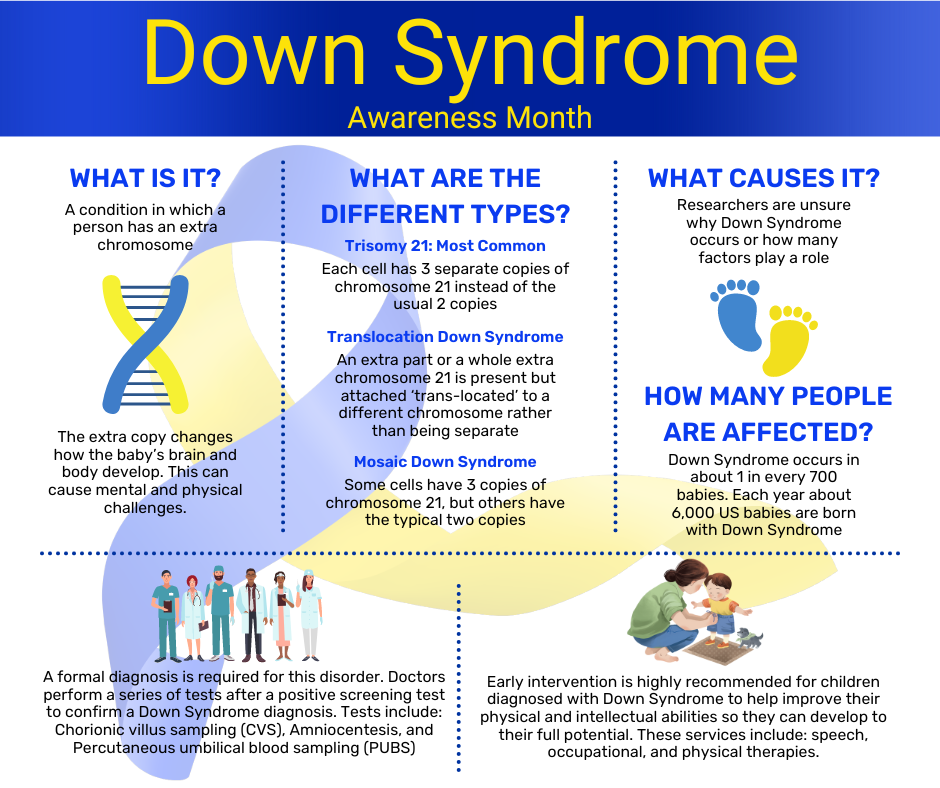
20 Tips for a Sensory Processing Disorder Friendly Halloween
October 12, 2023Halloween, with its costumes, candies, and eerie decorations, is a thrilling time for many children. However, for those with Sensory Processing Disorder (SPD), this holiday can present unique challenges. SPD can make the sensory overload of Halloween overwhelming. But fear not! In this blog post, we’ll share some invaluable sensory Halloween tips and ideas to ensure your child has a comfortable and enjoyable Halloween experience.
1. Prepare Your Child:
Start by preparing your child for Halloween. Explain the concept of the holiday and what to expect. Videos can be a great tool to help them visualize what Halloween is all about.
2. Visual Calendar:
Create a visual calendar to help your child countdown to Halloween. Seeing the days pass can provide a sense of predictability and reduce anxiety.
3. Pumpkin Alternatives:
Many children with SPD don’t enjoy carving pumpkins. Encourage them to paint or draw on them instead.

4. Comfortable Costumes:
Choose costumes that are comfortable and not overly frightening. Let your child have a say in picking their costume to ensure it aligns with their sensory preferences.
5. Less Is Best:
Remember, when it comes to costumes, less is often best. Avoid bulky or restrictive outfits that can cause discomfort.
6. Familiar Clothing:
Consider creating costumes from familiar clothing items. This can help your child feel more at ease in their costume.

7. Gradual Costume Familiarization:
Practice wearing the costume for short intervals, starting with just a few minutes and gradually working up to longer periods.
8. Show Costume Varieties:
Show your child pictures of different costumes they may encounter while trick-or-treating. Familiarity can ease anxiety.
9. Avoid Masks:
Most children with SPD don’t like masks. Opt for face paint or makeup instead, which can be less restrictive. Costumes that don’t need a mask, face paint, or makeup may be the best option for some children.
10. Walk the Route:
Before Halloween night, walk the trick-or-treat route a few times with your child to make it familiar and less intimidating.
11. The Joy of Giving:
Remind your child that Halloween isn’t just about receiving treats. Encourage them to be the one who hands out candies to neighbors, which can be a rewarding experience.
12. Early Trick-or-Treating:
Consider going trick-or-treating earlier in the evening, before it gets dark and potentially spookier.
13. Bring a Friend:
Having a friend along can provide extra support and companionship for your child.

14. Respect Their Limits:
If your child becomes tired or no longer wants to participate, don’t push them to continue. Respect their limits and end the evening.
15. Avoid Crowds:
Try to avoid crowded areas and houses while trick-or-treating to reduce sensory overload.
16. Sensory Gear:
Bring noise reduction headphones and sunglasses if your child is sensitive to loud noises or bright lights.
17. Maintain Routine:
Stick to your child’s regular bedtime routine to provide a sense of stability on Halloween night.
18. Sensory Diet:
Complete a sensory diet before and after trick-or-treating, incorporating activities like brushing, joint compressions, heavy work, swinging, or trampolining.
19. Fine Motor Skills:
Have your child attempt to open candy wrappers themselves, which can help improve fine motor skills.

20. It’s Okay Not to Go Out:
Lastly, remember that if your child doesn’t want to go out for Halloween, that’s perfectly okay. Their comfort and well-being should always come first.
Halloween can be a magical time for children, and with these sensory Halloween tips and ideas, you can help your child with SPD enjoy the festivities while minimizing stress and sensory challenges. By being understanding, patient, and supportive, you can create a Halloween experience tailored to your child’s unique needs and preferences.
If you child has been diagnosed with Limb Girdle Muscular Dystrophy and you are interested in learning more about how Schreiber’s Pediatric Therapies can help your child visit: http://www.schreiberpediatric.org/therapy-services/
As a nationally recognized pediatric facility, the Schreiber Center for Pediatric Development provides family-centered education and therapy programs for infants, children and adolescents with disabilities, developmental delays, and acquired injuries. Our goal-oriented approach maximizes each child’s ability to function independently within the community.
Living & Thriving with Cerebral Palsy
October 6, 2023Written by Katie Martin, Former Schreiber Client
I was born 10 weeks prematurely in 1982, along with my twin brother Adam (who is 14 minutes younger) and was diagnosed with spastic quadriplegic cerebral palsy at 6 months old. Cerebral palsy is a physical condition that affects mobility and posture that for me, was caused by a lack of oxygen and severe brain bleed at birth. I started physical, occupational, and speech-language therapies at Easter Seals (now Schreiber Center for Pediatric Development) shortly after my diagnosis.
In addition to Adam, I also have a younger sister, Laura. Both of my siblings are able-bodied; they do not have special needs. My parents had the same expectations for the three of us; we were expected to work hard and to put forth our best effort with whatever we chose to do. I was not treated any differently as a result of my special needs, which was a gift. Adam, Laura and I have a great relationship. We enjoy spending time together and we give each other a hard time sometimes (like most siblings do). They are supportive of me and vice versa.
For my family and me, Schreiber was a place of hope. Doctors were non-committal about what to expect for my future, while the therapists at Schreiber were determined to help me make the most of my abilities. As a result of my cerebral palsy, I am unable to walk, so therapists taught me to drive an electric wheelchair at the age of four. It was my first taste of independence, being able to move around on my own. I also attended the preschool program at Schreiber as a start to my education. With the support and encouragement of my teachers, Sally Wilbur and Irene Buch, my parents realized that they needed to advocate for me to be mainstreamed in a regular classroom with my typical peers. They did just that and I graduated from Penn Manor High School in 2000 and moved on to receive a degree in Public Relations from Millersville University in 2004.
I always knew that I wanted a career that allowed me to help people with special needs in some way, and joining the Schreiber staff in September of 2007 as the Grant Writer fulfilled that calling. I am honored to be able to work for and give back to an organization that has helped me in many ways. Eleven years ago, I was able to move into my own home and I receive assistance from attendants, who help me with my personal care needs. I have a roommate, my friend, Laura, who I met years ago when we were both Schreiber clients. Along with the support of my family, the support I received from many Schreiber therapists, (including OT, Becky Smith) when I was a client allowed me to realize that even with my special needs, I could lead a productive, fulfilling life.
My diagnosis of cerebral palsy is a part of who I am, but my life is not defined by it. I am a daughter, sister, aunt, friend and camp counselor. I love to spend time with family and friends. I like to do things people do not expect. For example, I “ran” a 5k race with my siblings in 2014, and I got “Believe” and “Hope” tattoos on my arms in 2022. I love to read; Kristin Hannah is my favorite author, and listening to Country, Christian, Pop and Christmas music is my favorite way to relieve stress. I have seen Brad Paisley, Bon Jovi, Darius Rucker, Michael Buble, Rascal Flatts and Zac Brown Band in concert. A perk of needing to use a wheelchair is that it allows you to get great seats at the Giant Center and Hershey Park Stadium. The same thing is true when watching baseball games at Citizens Bank Park (Go Phillies!), Camden Yards (Go Orioles!) and PNC Park in Pittsburgh.
Having special needs can be very stressful. I am stubborn. I do not like asking for help. However, it was important that I learned how to be my own advocate and ask for help when I needed it. Figuring out my attendant care schedule is a constant job that will never end. With that being said, I am extremely thankful for the attendants that help me throughout the day with my activities of daily living, so that I can be as independent as possible. It truly does take a village; I would not be able to do what I do without my support system. I joined a support group for adults who have cerebral palsy last year through Kennedy Krieger Institute in Baltimore, where I have been a patient since 2014. We meet once a month through Zoom, and it is very helpful to connect with people who are going through similar challenges and to get advice.
I am grateful that my job at Schreiber allows me to put my challenges in perspective, so that I can do my best to help the clients who need our services every day. I chose to share my story with you, the Schreiber community, in honor of World Cerebral Palsy Day to illustrate that even though I may have more challenges than other people, I truly believe that having cerebral palsy has helped to shape me into the compassionate, confident, independent, productive, and strong adult that I am today.
If you child has been diagnosed with Cerebral Palsy and you are interested in learning more about how Schreiber’s Pediatric Therapies can help your child visit: http://www.schreiberpediatric.org/therapy-services/
As a nationally recognized pediatric facility, the Schreiber Center for Pediatric Development provides family-centered education and therapy programs for infants, children and adolescents with disabilities, developmental delays, and acquired injuries. Our goal-oriented approach maximizes each child’s ability to function independently within the community.
